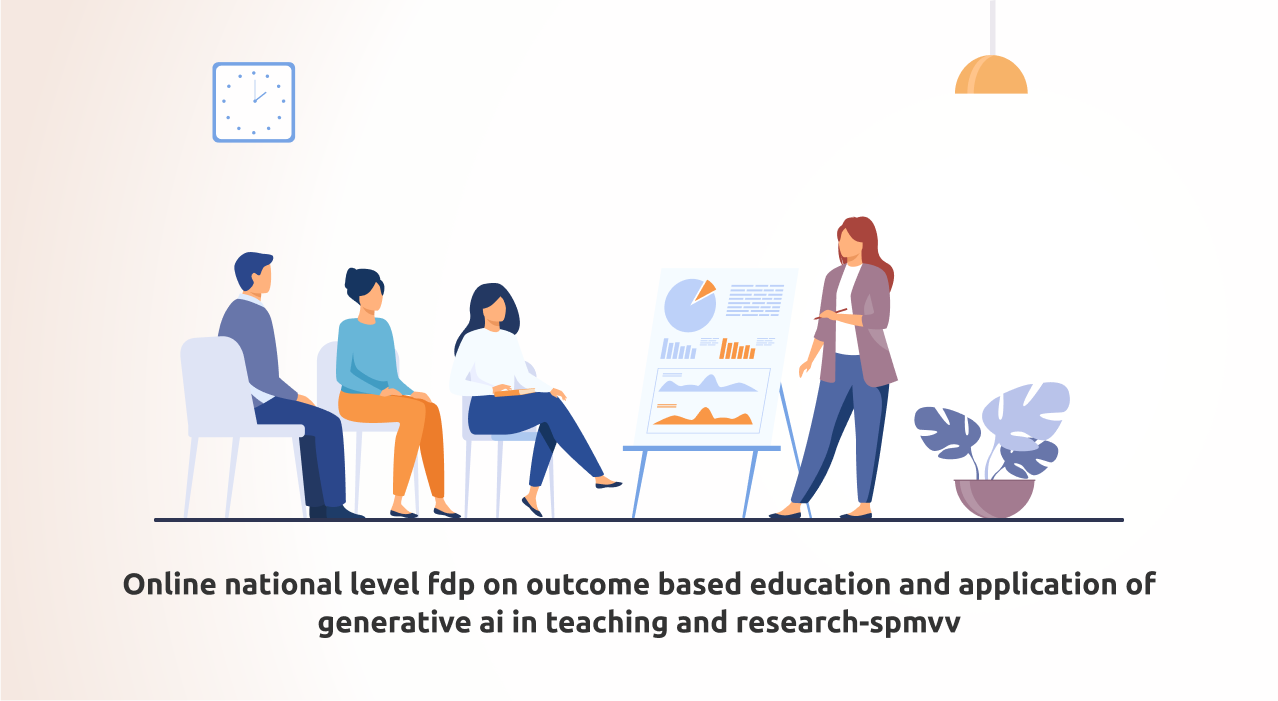
The resource persons for the seven-day sessions were Dr Sunil Job KA, Dr Suresh Namboothiri, and Dr Thomas Varghese.
Programme sessions are delivered through synchronous-asynchronous hybrid mode.
Live webinars steered the Inaugural session and streamed through multiple channels.
Hands-on Activities through LMS provide an enriched learning experience.
1509 Participants and 593 Institutions from 26 States and 6 Union Territories in India, one each from UAE, Afghanistan and Saudi Arabia registered, of which 555 participants accessed both online sessions and the LMS platform and the remaining 954 participants attended the online sessions alone.
Deans, Head of the Departments, and Faculty Members from Higher Educational Institutions across the Indian States and from abroad.
In the ever-evolving education landscape, the focus has shifted towards Outcome Based Education (OBE) as a paramount approach to ensuring holistic development and relevance in learning outcomes. OBE prioritizes defining clear, measurable objectives and aligning educational activities to achieve these objectives effectively. This paradigm shift emphasizes not only what students are expected to know, but also what they can do with the knowledge they acquire. The significance of OBE lies in its ability to foster critical thinking, problem-solving skills, and practical application of knowledge, preparing learners for real-world challenges and success in their respective fields. This shift towards outcome-centric education is essential in preparing students for the dynamic demands of the modern workforce and society.
Moreover, the integration of Generative Artificial Intelligence (AI) in teaching and research has emerged as a transformative force, reshaping traditional educational methodologies and scholarly pursuits. Generative AI refers to systems capable of producing outputs that mimic human creativity, such as autonomously generating texts, images, or even music. By harnessing the power of Generative AI, educators can augment teaching materials, create personalized learning experiences, and streamline administrative tasks. Similarly, researchers can leverage Generative AI algorithms to explore complex datasets, generate hypotheses, and accelerate the pace of discovery across various disciplines.
The synergy between Outcome Based Education and Generative AI presents a unique opportunity to revolutionise the educational landscape. By incorporating Generative AI, technologies into OBE frameworks, educators can tailor learning experiences to individual student needs, fostering engagement and enhancing retention rates. Furthermore, Generative AI enables the creation of dynamic and adaptive educational content that evolves in response to student feedback and learning outcomes, ensuring continuous improvement and relevance in curriculum design.
In the realm of research, the application of Generative AI holds immense promise for accelerating innovation and pushing the boundaries of knowledge across diverse fields. From natural language processing to image generation and beyond, Generative AI algorithms empower researchers to explore complex phenomena, simulate experiments, and generate novel insights at unpretending speeds. By automating repetitive tasks and facilitating data-driven decision-making, Generative AI streamlines the research process, allowing scholars to focus their efforts on high-impact activities and breakthrough discoveries.
In summary, the integration of Outcome Based Education and Generative AI represents a paradigm shift in education and research, emphasizing learner-centric approaches and data-driven innovation. By embracing these transformative technologies, educational institutions and researchers can unlock new possibilities for personalized learning, interdisciplinary collaboration, and societal impact. Through collaborative efforts between educators, researchers, and AI experts, the integration of generative AI in education has the power to drive meaningful advancements in pedagogy, curriculum development, and student outcomes. As we navigate the complexities of the 21st century, it is imperative to harness the synergies between Outcome Based Education and Generative Artificial Intelligence to empower learners, advance knowledge, and shape a more inclusive and sustainable future.
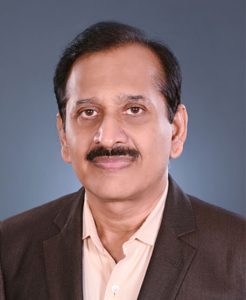
Professor & Director, MCA, Marian College Kuttikkanam (Autonomous) and MD & CEO of ipsr solutions limited.
Dr Mendus Jacob, Director of MCA, Marian College Kuttikkanam, (Autonomous) is also the MD and CEO of ipsr solutions limited, an IT company supporting Higher Educational Institutions in implementing Outcome Based Education and Innovative Teaching-Learning and Assessment Strategies
A former Director of the School of Applicable Mathematics, MG University, Dr Mendus Jacob is an Academician and Entrepreneur with 35+ years of experience and a well-known resource person for FDPs in OBE, NEP and Accreditation.

Associate Professor and Academic Mentor, Marian College, Kuttikkanam (Autonomous and Chief of Academics, ipsr solutions limited.
Dr Sunil Job, is an Adjunct Faculty, Marian College Kuttikkanam (Autonomous) and Chief of Academics, ipsr Solutions Limited.
An Academician well-versed in OBE and a resource person for National Conferences at FDPs, Dr. Sunil Job with 30+ years of experience in teaching and 10+ years in Corporate Consultancy is the Associate Professor at MG University, College of Teacher Education since 1999.
A resource person for several FDPs in OBE, Data Science, E-Learning etc., Dr Sunil has served as a Visiting Team Member of NCTE for ‘Grant of Recognition’ and as a resource person for the Affiliation Renewal Committee of MG University.
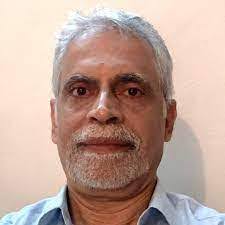
The Founder Member of Espoir Technologies Pune.
Dr Suresh Namboothiri, a product design specialist with over 30 years of industry experience is the Director of Espoir Technologies Pune. Dr Namboothiri collaborates with HEIs like IITs, NITs and other premium institutions for improving the employability of students.
A former Chief Operating Officer with Tata Motors, he was part of the team that developed the first Indian car – Indica. A well-known resource person for FDPs on OBE, Critical and Creative Thinking, Dr Suresh Namboothiri, a designer and developer of 200+ products with over 30 years of industry experience, is also the founder of Espoir Technologies, Pune. He is a Mentor, Researcher, and Educator in addition to a senior Corporate Consultant.
Chair, Finance Program, J R Shaw School of Business, Northern Alberta Institute of Technology, Canada
Dr Thomas Varghese Chairs the Finance Program at J R Shaw School of Business, Northern Alberta Institute of Technology, Canada and also serves as Subject Matter Expert at Athabasca University in Canada. He has authored numerous papers in Statstics and Education and has presented at various National and International Conferences. In addition to his academic pursuits, Dr Thomas is passionate about community service, volunteering in his community and church
Dr Thomas has won multiple awards in Lionism and is a Certified Lions Instructor, showcasing his dedication and expertise within the organisation.
Participants in the Faculty Development Programme include Deans, Heads of Departments, and Faculty Members from Higher Educational Institutions across the Indian States and abroad.
1509 participants took part and benefitted from the six-day Faculty Development Programme on Outcome Based Education and Application of Generative AI in Teaching and Research organised by the DST-CURIE-AI Centre, Sri Padmavati Mahila Visvavidyalayam (SPMVV), Tirupati, in association with ipsr solutions limited
The inaugural function of the six-day Faculty Development Programme on Outcome Based Education and Application of Generative AI in Teaching and Research organised by the DST-CURIE-AI Centre, Sri Padmavati Mahila Visvavidyalayam (SPMVV), Tirupati, in association with ipsr solutions limited began at 19.00 Hrs, 18 March 2024.
Prof V Saritha, Dept of CSE, SoET at Sri Padmavati Mahila Visvavidyalayam delivered the welcome speech. In her speech, Prof Saritha cordially welcomed the Vice Chancellor and the Registrar of Sri Padmavati Mahila Visvavidyalayam to the function. She also took time to give a hearty welcome to Dr Mendus Jacob, his team members and all the dignitaries who had attended the week-long Faculty Development Programme.
Dr Depuru Bharathi, Vice Chancellor of SPMVV, and former Professor of Biosciences and Sericulture delivered the Inaugural Address. During her speech, she mentioned that it is imperative for educators and researchers to constantly adapt and innovate to meet the needs of the students and the demands of the contemporary world and that the theme of the programme is very prominent and relevant. She went on to mention that the approaches have the potential to revolutionize the way one will teach, learn and conduct research. According to her, Outcome Based Education provides a framework which ensures that the faculty not only acquires knowledge, but develops the skills, competencies, and attitudes necessary for success in their personal and professional life. Dr Bharathi also mentioned that it empowers the faculty to become lifelong learners and critical thinkers who can adapt to the complexities of the rapidly changing world. She further went on to mention that the application of Generative Artificial Intelligence opens up
exciting possibilities for enhancing teaching methodologies and conducting research in ways that were previously unimaginable. She expressed her hope that all participants will have the privilege of learning from the foremost experts in the fields of Outcome Based Education and Generative AI.
Dr Mendus Jacob, MD & CEO, ipsr solutions limited and Professor & Director, MCA, Marian College Kuttikkanam, Autonomous provided the introduction to the Faculty Development Programme. Dr Mendus started his speech by welcoming all the dignitaries of SPMVV and the distinguished participants from all across India. He mentioned that the diverse gathering promises rich interactions and insights that will prove valuable in refining our approaches to innovative teaching, learning, and assessment activities., particularly in light of the challenges posed by the lack of expertise among faculty members in the practical implementation of Outcome Based Education. Dr Mendus further went on to mention that, in line with the commitment to innovation, the Learning Management System (LMS) exemplifies the effective use of online platforms for Higher Education by integrating various features including workshops for learning and assessment, lesson activities for assured learning, and forums for collaborative engagement. Additional tools like Mentimeter and Padlet further enhance the participant experience.
Prof S Jyothi, Coordinator, DST-CURIE-AI Centre, Sri Padmavati Mahila Visvavidyalayam, Tirupati delivered the Word of Thanks. In her speech, Prof Jyothi expressed her gratitude to the team members of IPSR Solutions for collaborating with the institution thereby making the programme possible. She further went on to thank the honourable Vice Chancellor and Registrar for making an MoU thereby making the FDP possible. She further took time to thank the resource persons, the members behind the scenes – both from the University and ipsr solutions and all the participants who have actively participated in the week-long Faculty Development Programme.
Click to watch the inaugural session of the Faculty Development Programme on Outcome Based Education and Application of Generative AI in Teaching and Research.
Bloom’s Taxonomy: Sunil Job KA
Dr Sunil Job, the resource person for the first day’s session thanked the members of Sri Padmavati Mahila Visvavidyalayam for allowing him to conduct a resource session and interact with the participants on the contemporary topic, Outcome Based Education and how to integrate the possibilities of Generative AI in it.
Dr Sunil started the session with Bloom’s Taxonomy as evolved from the 1956 original level to the revised version by Mr Anderson, an associate of Benjamin Bloom in 2001, how the transformation occurred from a taxonomical perspective and its relevance in the present context.
He explained the six taxonomy levels, classified as Remembering, Understanding, Applying, Analyzing, Evaluating, and Creating. Dr Sunil took time to explain in detail the Revised Version of Bloom’s Taxonomy. Dr Sunil further discussed ‘What is Learning’ and proceeded to the main topic. He explained in detail the three hierarchical models – Cognitive, Affective, and Psychomotor Domains – used to classify educational learning objectives into levels of complexity and specificity. During his session, Dr Sunil stressed that the most important highlight of the New Education Policy 2020 is that it provides a lot of autonomy to the institutions, teachers, students etc.
After the completion of the session by Dr Sunil Job, the first task ‘ Question Paper Analysis based on Bloom’s Taxonomy’ was assigned to the participants which will help to understand the depth of knowledge they have gained from the session.
Click to watch the day-one session- Bloom’s Taxonomy by Dr Sunil Job.
Dr Sunil Job started the second-day session with a brief introduction to the previous day’s session – the significance of Bloom’s Taxonomy and how Bloom’s Taxonomy will hand-hold in the OBE journey – which are very important during the formulation of outcomes, interacting with students in an Outcome Based Education format, and for designing the assessment tools in paw with the indicators.
He mentioned that the second-day session would be focused mainly on how to frame an outcome as the entire process of Outcome Based Education revolves around it and goes on to mention that major changes are expected in the methodologies, strategies, and the process of marching through the educational processes along the lines of the New Educational Policy. He mentioned that Outcome Based Education is based on the four principles of Clarity of Focus, Designing Down, High Expectations, and Expanded Opportunities. Dr Sunil also explained the importance of quality checks’ requirements for attaining a good outcome.
During the session, Dr Sunil explained the Program Educational Objectives, Graduate Objectives, Program Outcomes, Program Specific Outcomes, Course Outcomes, and Writing-Learning Outcomes.
A second task ‘Course Outcome and Quality Check’ was assigned to the participants in the form of a workshop activity after the completion of the second-day session. A Multiple Choice Question format was also assigned to the participants as an additional task.
Click to watch the second-day session Architecture of OBE & Design of Outcomes by Dr Sunil Job.
Dr Mendus Jacob the resource person on the third day of the Faculty Development Programme discussed the topic on Mapping of Outcomes, Calculation of Attainment & Analytical Reports, and AI-Assisted Assessments. Dr Mendus started the session by providing an introduction to the OBE process and the various levels of mapping.
Dr Mendus explained in detail how PEOs, POs, PSOs and COs can be mapped. He mentioned that there are two levels of Mapping, the first being the CO-PO mapping or the CO-PSO Mapping, whereas the second is the activity or assessment level mapping with COs. Dr Mebdus stressed that mapping is to be done before the attainment calculation and further went on to state that Pos and PSOs are estimated from the component of COs related to the respective PO and PSO, whereas COs are estimated from the component-learning outcome of the activity related to the course.
During the session, Dr Mendus discussed the difference between the traditional system, where the Traditional System is more Teacher-Centric, with importance given to Teaching and Content, Knowledge-Driven and Rote Learning, while the OBE System is more Student-Centric giving more importance to Learning and Process thereby ensuring Knowledge and Performance.
Dr Mendus conducted a Mentimeter survey during the session based on the topic Strong Pillars of a Teacher, where the participants could provide their valuable opinions.
Two tasks, ‘Formulation of Assessment Questions for a Course Outcome and Finding the Mapping Strength’ and ‘CO Computation Prototype Model’ were assigned after the day’s session. An additional task in the form of Multiple Choice Questions was also assigned to the participants.
Click to watch the day three session Mapping of Outcomes, Calculation of Attainment & Analytical Reports, and AI-Assisted Assessments by Dr Mendus Jacob.
Dr Thomas Varghese, the resource person on the fourth day of the Faculty Development Programme started his session by thanking the organisers and the resource persons for choosing the most important topic, which is Outcome Based Education and Generative AI. Before entering into the main topic, Dr Thomas guided the participants into what they had learned/listened to during the past three days to make the next step progression easier.
Dr Thomas mentioned that for the Outcome Based Education process to be complete, all the basic principles namely ‘Clarity of focus, Design Down and Deliver Up, Involvement, Comparison, and Flexibility clearly outlined. Dr Thomas said, “Outcome Based Education means, organising results based on what we do instructionally on the outcomes that we want to achieve – whether in specific parts of the curriculum or the schooling process as a whole”. He further mentioned that organising programs and instruction clearly defined outcomes while curriculum and instruction are driven by exit outcomes. He also discussed the difference between traditional education and Outcome Based Education.
Dr Thomas mentioned that in Canada, OBE ensures that the curriculum is relevant to the needs of the industry and discussed the importance of what is taught and how it is taught during every phase of education. He went on to stress that the right business career needs to be found for every institution, in which the programs must be designed to equip the students with the skills, knowledge, and hands-on experience, essential for success in today’s rapidly evolving business landscape. He also stressed the importance of creating industry connections with students – which are possible through Guest Speakers, Mock Interviews, Finance Speaker Series, Alumni Services, Institutional Research etc. and the need for Graduate Placement Surveys to maintain industry relationships.
Dr Thomas went on to mention that the Northern Alberta Institute of Technology are the leader in experiential learning with an unmatched connection to industry and has developed student competencies by applying knowledge to practice in real-world challenges. He further stated that the staff are industry experts with a passion for their chosen fields and are intensely focused on creating a prosperous Alberta and thriving Albertans.
Click to watch the fourth-day session Best Practices in OBE – Case Study From a Canadian Institute by Dr Thomas Varghese.
The fifth day’s session of the week-long Faculty Development Programme was handled by Dr Suresh Namboothiri on the topic Underlying Threads of OBE, ChatGPT & AI Tools. He mentioned the importance of OBE comes to light when the standards of students are to be raised from the bottom level to a higher level and when he/she is expected to have certain attributes – otherwise known as Graduate Attributes – after passing out after graduation.
Dr Namboothiri discussed the five major principles of Lev Vygotsky’s Theories, which are:
1- Students construct their knowledge, 2- The learning is mediated, 3- Language plays a crucial role in mental development, 4- Learning appears twice, and, 5 – Development cannot be separated from its social context.
Dr Namboothiri continued his session with the topic 100 plus smart ways to use ChatGPT for an exciting classroom. In his talk, Dr Namboothiri mentioned that teachers can create exciting, contextual and relevant content for the classroom. He also mentioned that Artificial Intelligence is a tool that learns, reasons, solves problems, and understands natural language, thereby leveraging vast amounts of data and intricate algorithms to improve over time.
Three separate Multiple Choice Question tasks were assigned to the participants after the completion of the fifth day’s session.
Click to watch the day-five session Underlying Threads of OBE, ChatGPT & AI Tools by Dr Suresh Namboothiri.
Dr Suresh Namboothiri started the sixth day’s session based on the topic of AI in research, where he introduced various AI tools for searching literature and literature reviews. During the session, he stated that while ChatGPT, Perplexity, Jenni, Wisio, Bard etc. are some of the best AI tools for Content Generation, tools like Paper Digest, Openread, ChatPDF, Wordtune, PDF gear etc. are some of the best AI tools for Chat / Summarise / Paraphrase etc. in research matter. He further went on to mention that AI must aid the researcher in rapidly broadening and refining ideas, providing a fertile ground for research expansion and that with AI’s inherent critical thinking enhancer, it must push a researcher’s analytical abilities to new heights, thereby ensuring multi-dimensional problem-solving. During the session, Dr Namboothiri went on to discuss the twelve reasons why Generative AI doesn’t lead to Plagiarism.
He also introduced “Vigyana” – a very special platform for high-impact research and publications. He mentioned that this platform will assist through research methodology, Artificial Intelligence, Prompt Engineering, and Critical Thinking even if one has limited research knowledge. He explained in detail how the platform functions in assisting people in research.
The second session, OBE for Accreditation, and Useful Tools was handled by Dr Mendus Jacob where he highlighted the importance of implementing OBE in higher educational institutions. He stated that through the implementation of OBE, teaching quality and education quality will improve resulting in higher grades in the accreditation process. During his session, Dr Mendus mentioned the benefits of accreditation and how OBE assists in getting a higher rating. He stated that the implementation of OBE will provide innovative teaching, Learning and Evaluation methods, Improve the quality of Teaching and Learning, Improve placements, Improve Accreditation Ratings, and Help to meet the challenges of NEP. He further went on to introduce two useful tools which will assist institutions in generating quality question papers which is the first step in their journey towards OBE implementation and a better accreditation rating.
After the informative session, Dr Mendus Jacob introduced “QnSmart i” and “QuestionPaper.ai” – two powerful tools with a user-friendly interface and incorporated multiple features to streamline the process of quality question paper generation.
Dr Mendus Jacob introduced ”QnSmart i” and “QuestionPaper.ai” to the participants as two revolutionary tools designed to streamline the process of question paper creation in the realm of education. He mentioned that with these platforms, educators will have the power to craft their templates by drawing from a diverse gallery of quick templates, efficiently generate question papers and that these templates can be copied, modified, and archived for future use, ensuring maximum flexibility. On mentioning question generation, Dr Mendus said what truly sets these two software apart is their flexibility in generating questions from any topic, or discipline, or accommodating various levels of Bloom’s Taxonomy. He also mentioned that as the systems are aligned with Outcome Based Education, it allows input of Course Outcomes and maps questions accordingly facilitating the assessment process. Regarding the cost-effectiveness of the software,
Dr Mendus mentioned that it’s a time and cost-efficient solution as it lets to archive question papers for future reference, thereby saving valuable time. He also mentioned that “QnSmart i” and “QuestionPaper.ai” aids in generating accurate answers for the questions generated, simplifying the preparation of scoring keys and valuation schemes, making it an indispensable tool for crafting multiple-choice questions with distracting options and correct answers. In his concluding words, Dr Mendus mentioned that the implementation of these platforms will be the first step towards the implementation of OBE, enhancement of curriculum quality, and most importantly, saving valuable time of faculty members and considerable cost savings to the institution compared to the traditional method of question paper preparation.
The versatile template system allows educators to create customized templates to suit their specific requirements and the gallery of quick templates allows quick question paper generation. The copy, modify and archive facility ensures efficiency and consistency in question paper design. The system can effortlessly generate questions from any topic or discipline and at various levels of Bloom’s Taxonomy. The educators have the flexibility to edit, regenerate, and modify questions ensuring uniqueness in each paper and tailored to their teaching objectives.
Being ‘Outcome Based Education’ friendly, the software enables users to input Course Outcomes (COs) and map each question to the respective COs ensuring alignment with curriculum goals and assessment standards. The software, apart from being economical in terms of time and cost, allows users to archive question papers for future reference, reducing the repetitive task of question paper creation. The tool excels in generating accurate answers facilitating the preparation of scoring keys and valuation schemes, and is an invaluable resource for creating a diverse set of options and correct answers for multiple-choice questions, contributing to fair and efficient grading processes.
Dr Mendus concluded the session by thanking all the participants for their eager and active participation in the week-long Faculty Development Programme.
Two tasks in the form of Multiple Choice Questions were assigned to the participants after the session.
Click to watch the sixth-day sessions on AI in research and OBE for Accreditation, and Useful Tools by Dr Suresh Namboothiri and Dr Mendus Jacob.
Feedback:
Join us for FREE to get instant email updates!
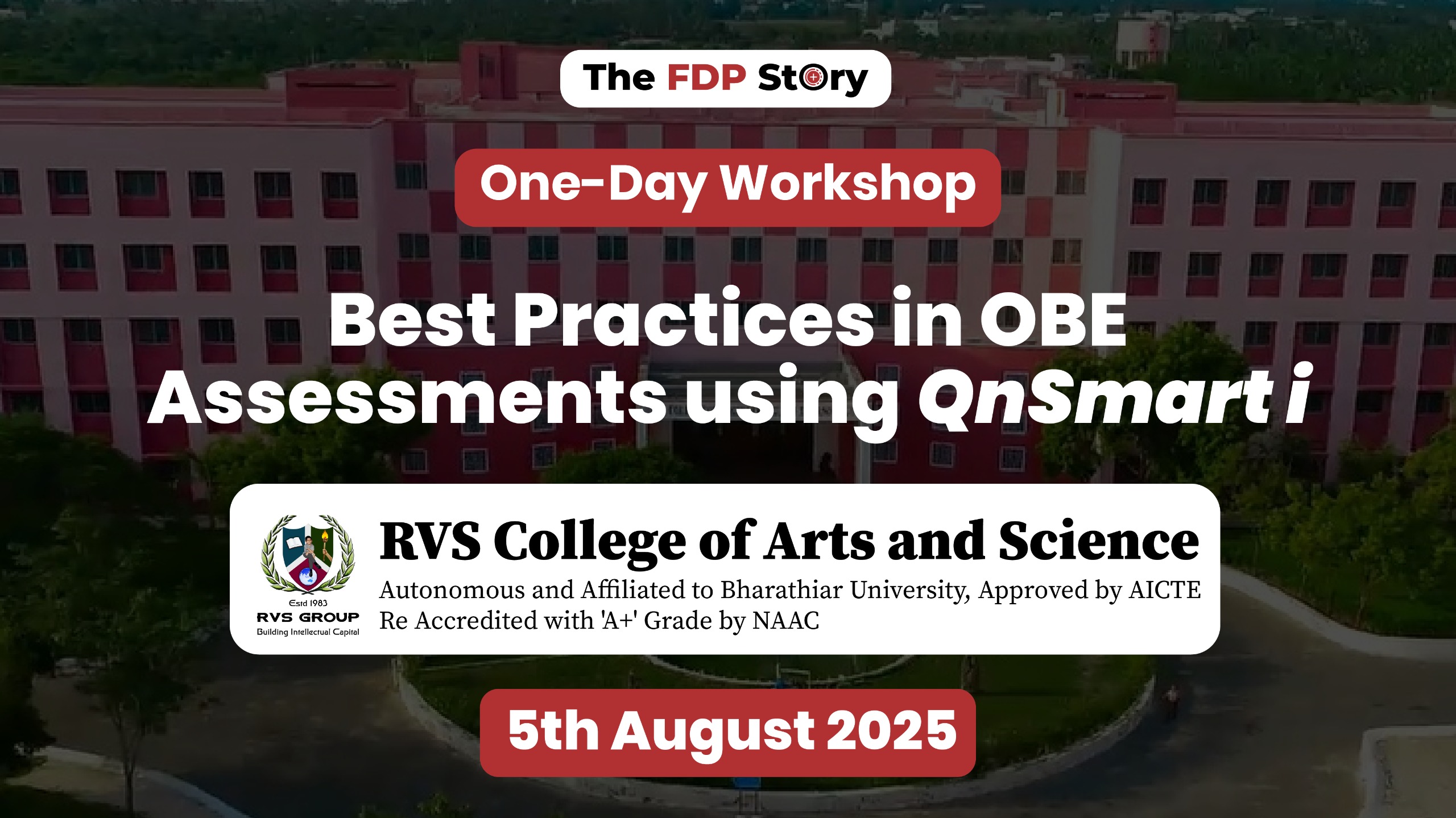
The Internal Quality Assurance Cell (IQAC), in collaboration with the […]
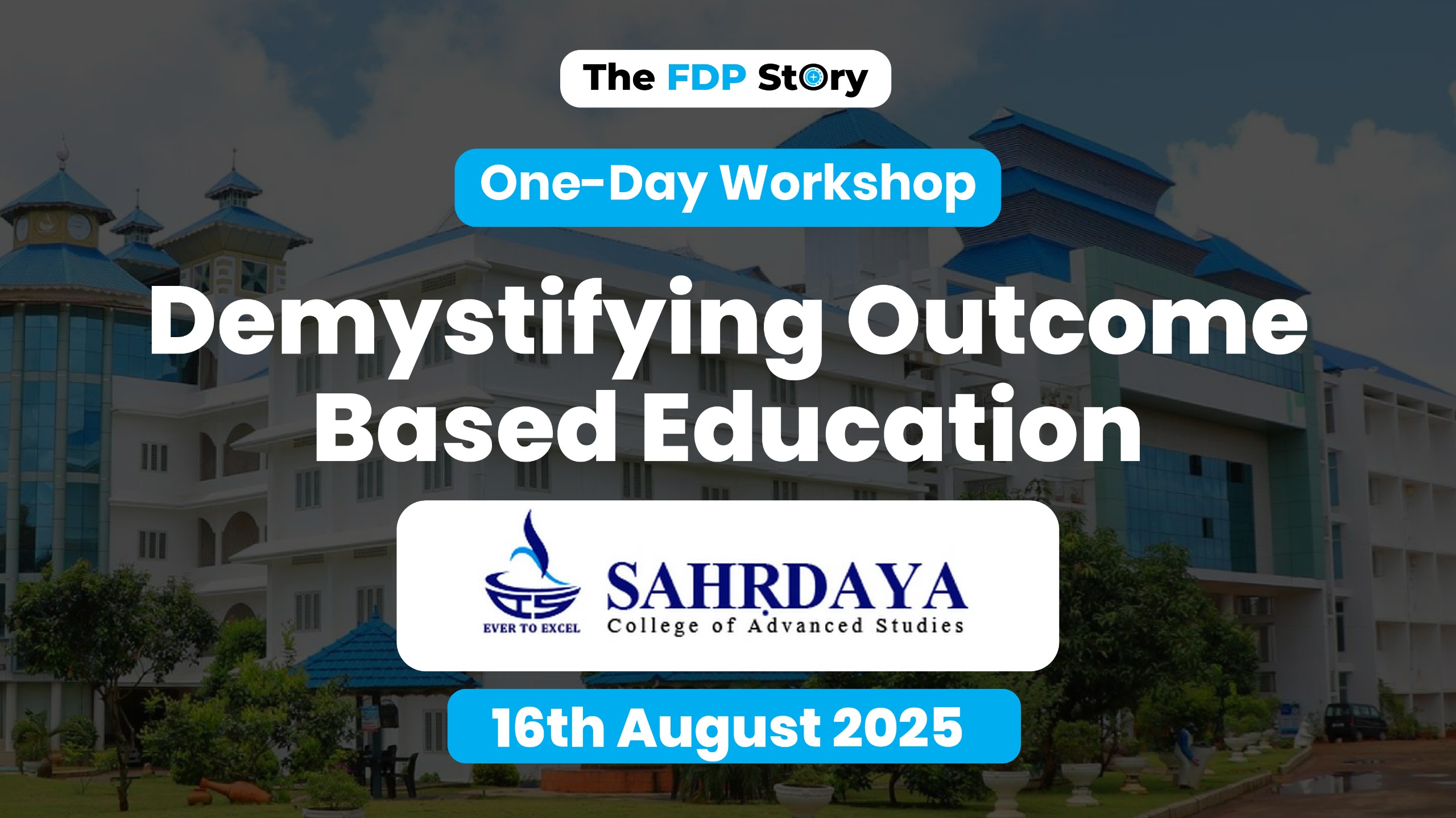
A one-day workshop on Demystifying Outcome-Based Education (OBE) was successfully […]
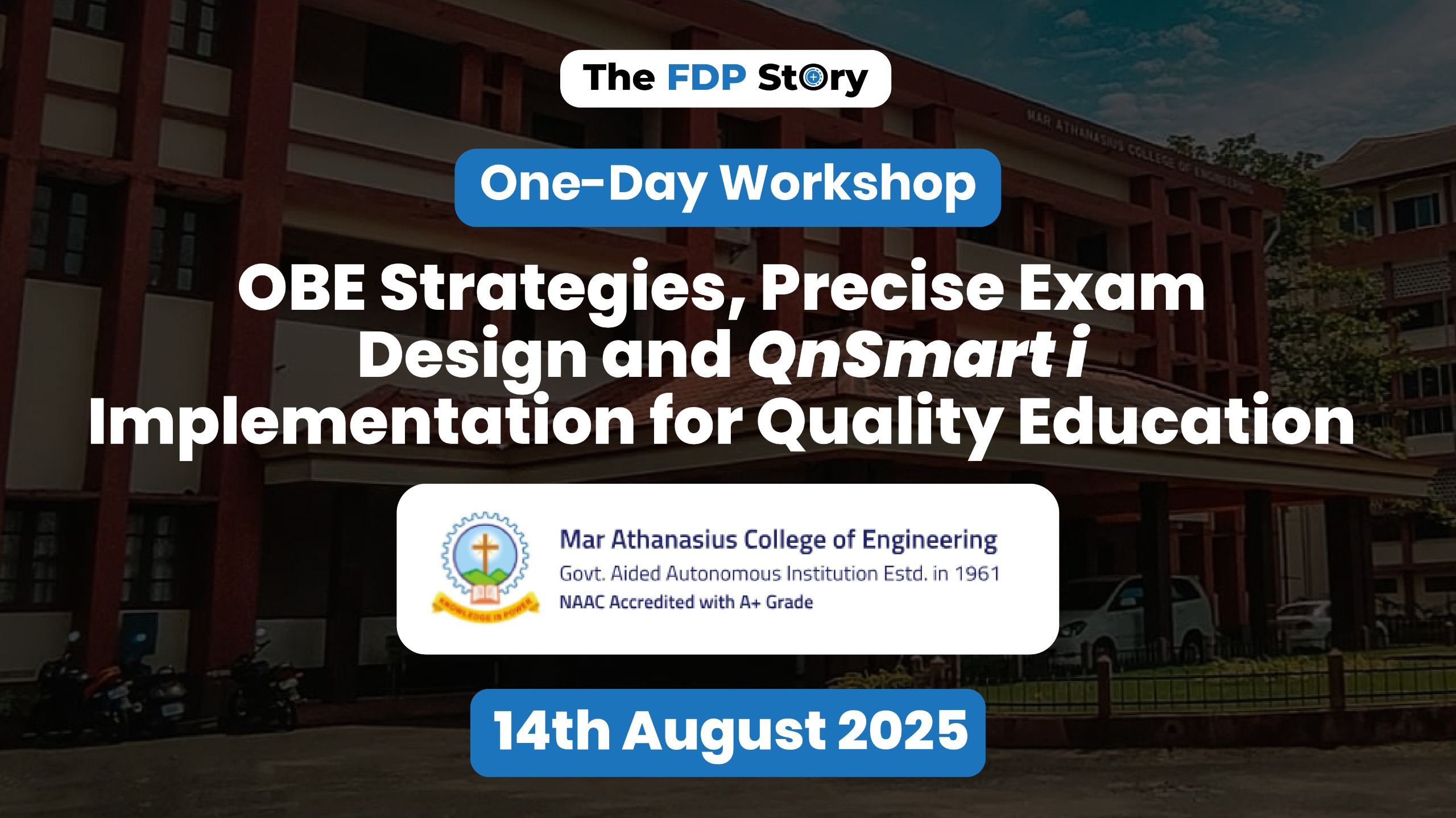
As part of Mar Athanasius College of Engineering’s continuous pursuit […]
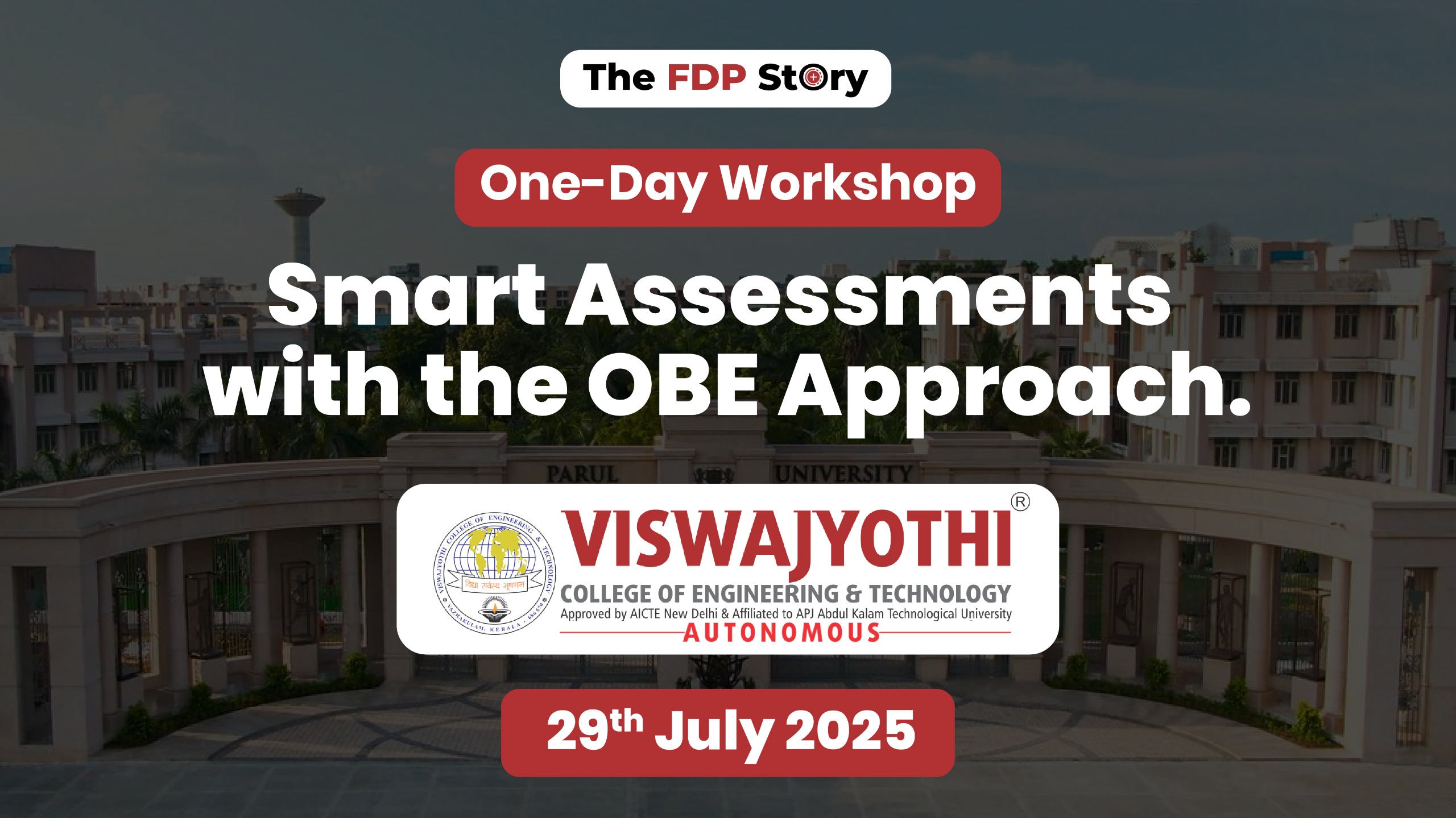
A one-day workshop on Smart Assessments with the OBE Approach […]
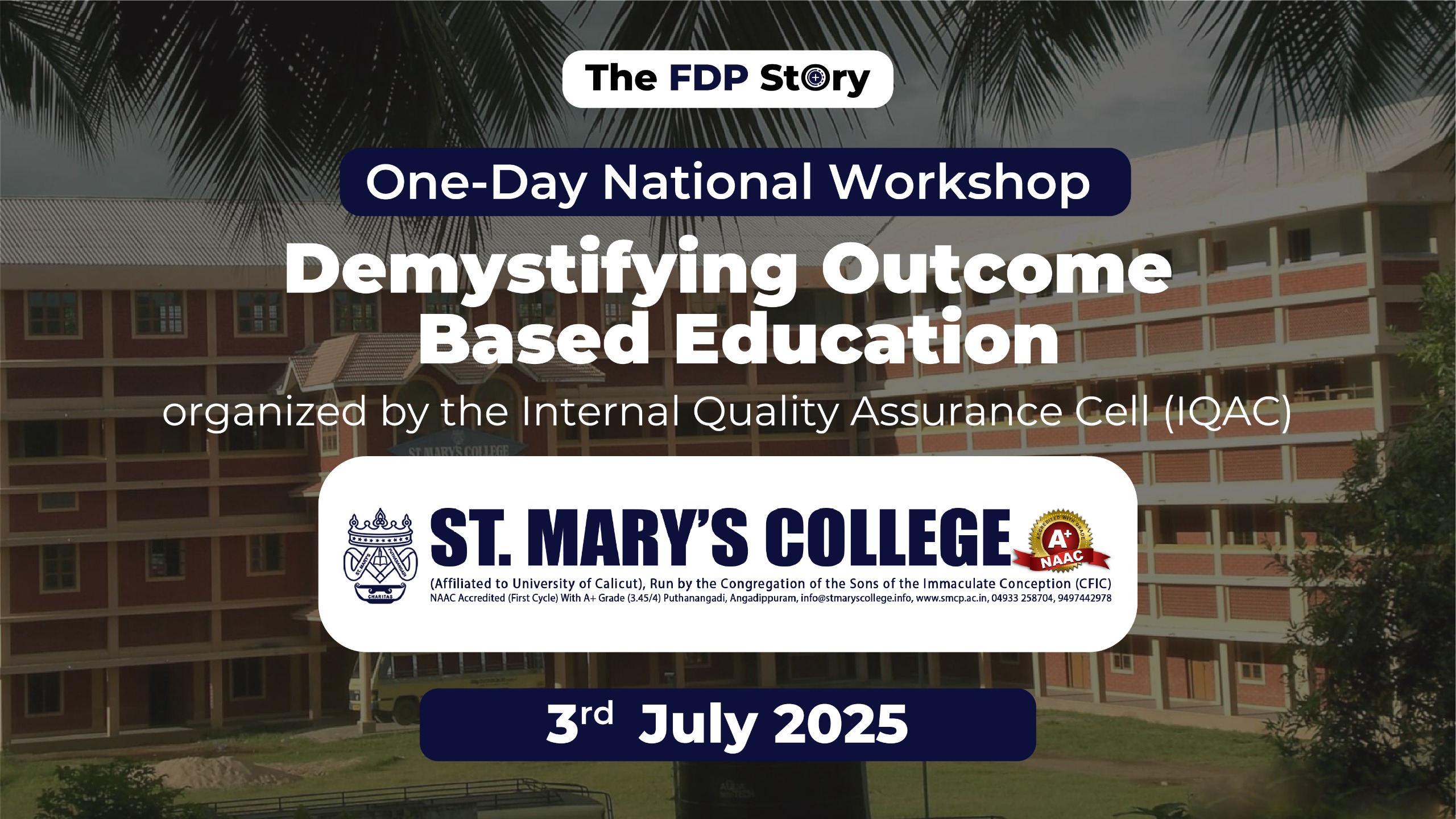
A one-day national-level workshop on Demystifying Outcome-Based Education (OBE) was […]
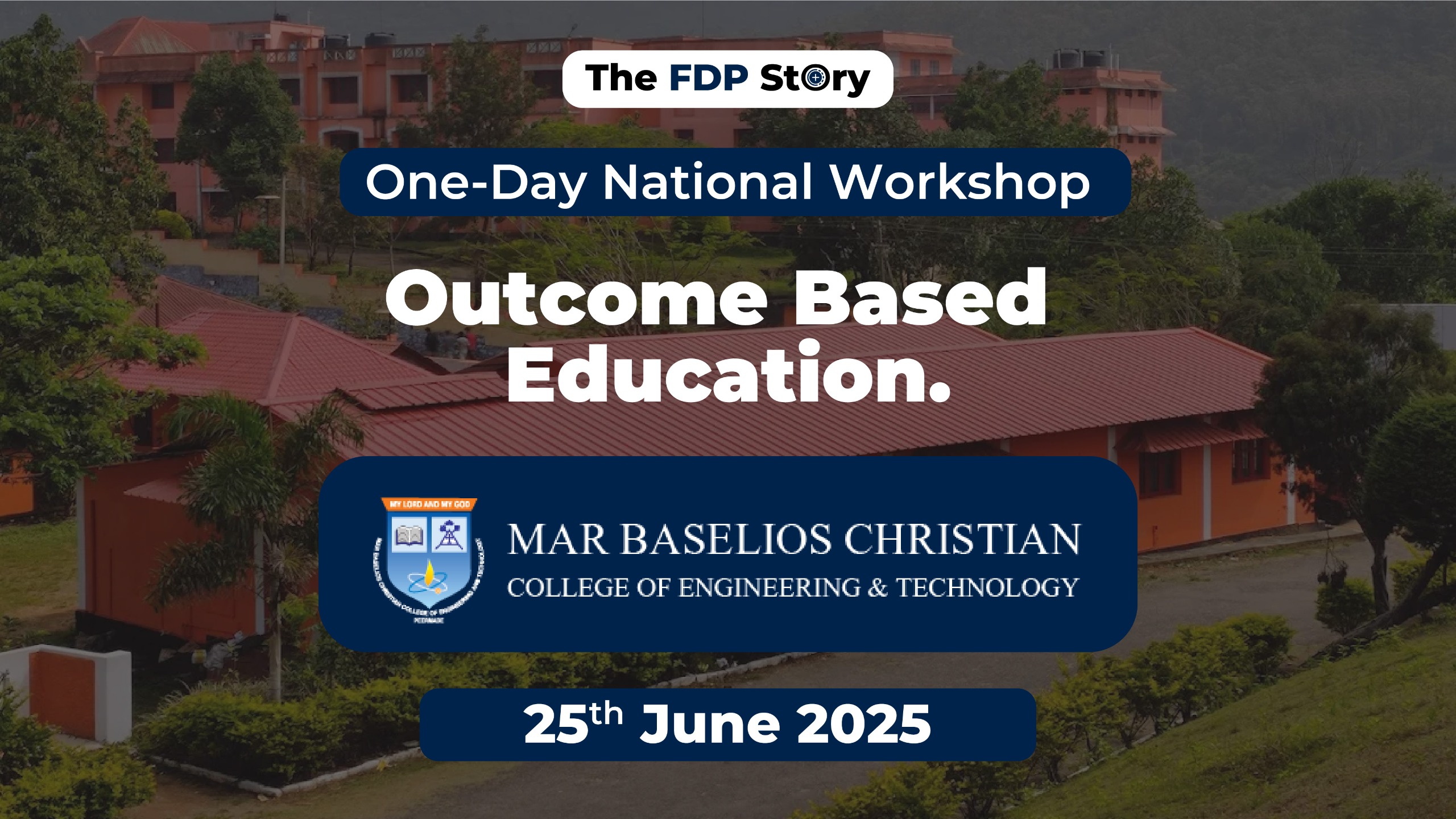
The Faculty Development Programme on Outcome Based Education (OBE) was […]

St. John Group of Institutions, under the Aldel Education Trust, […]
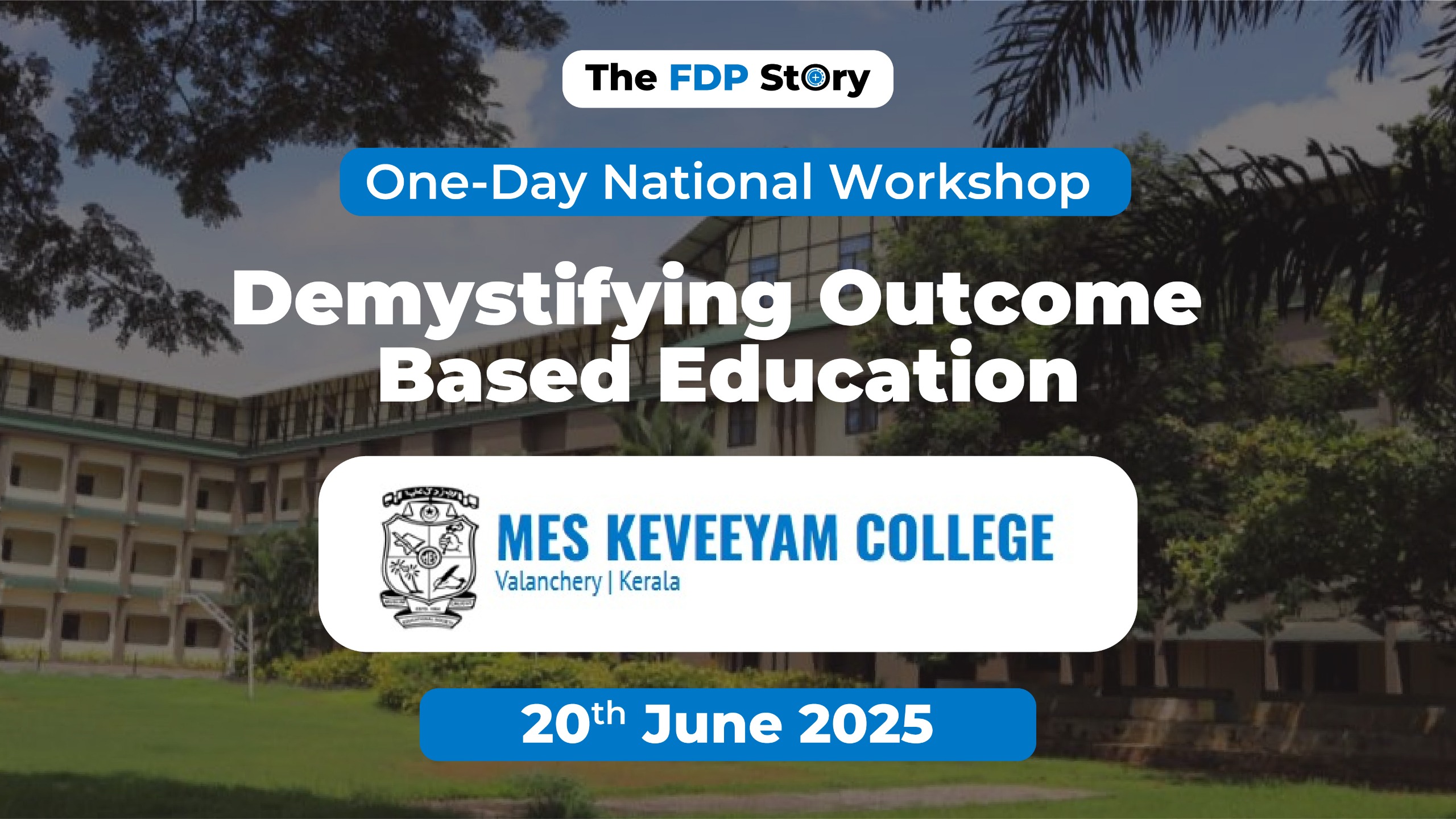
MES KEVEEYAM College, Valanchery, Malappuram, successfully hosted a One-Day National […]

As part of Parul University’s continued commitment to enhancing academic […]
Leave A Comment